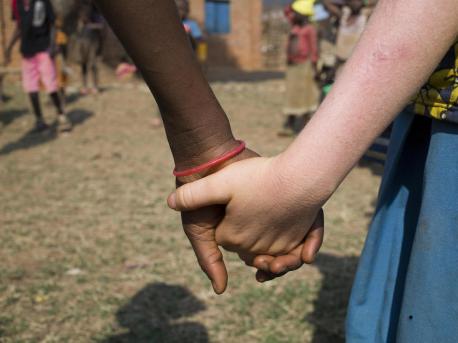
Step Up and Be Counted in the 2020 U.S. Census
Children under age 5 are routinely overlooked in the U.S. census. In 2020, let's make sure we're all accounted for.
Every 10 years, the U.S. Government is mandated by the Constitution to conduct an accurate head count of the population. Census data are used to determine funding allocation of billions of dollars to schools, hospitals, fire department, Federal programs and other resources for the coming decade.
Why are children under 5 undercounted in the U.S. census?
Unfortunately, certain sectors of the population — like young children — are considered "hard to count" and at risk of being overlooked. Kids who live in large and complex households are often undercounted. If parents are separated, for example, which household should list the child? Children growing up in poverty, children living with grandparents or other relatives and children whose families do not speak English or whose families include immigrants are also likely to be miss being counted.
- According to the United States Census Bureau, approximately 1 million children under the age of 5 weren't counted in the 2010 census
- Count All Kids, a coalition of national, state and local children's organizations dedicated to an ensuring an accurate census count of the nation's children, estimates that the 2010 census missed more than 10 percent of all children under age 5 in the U.S., including 6.3 percent of black children and 7.5 percent of Hispanic children
- An Urban Institute report examining states with large populations of historically undercounted groups found that California has the greatest undercount risk in 2020, followed by New York, California, Texas, New Mexico, Nevada, Georgia and Florida
Starting now: Join our webcast from the Counting Young Children Event in Cleveland, OH about the importance of an accurate count on the #2020Census. https://t.co/vyd2C5QE0Upic.twitter.com/80kI05kth5
— U.S. Census Bureau (@uscensusbureau) February 22, 2020
Why complete the 2020 census?
Here are 4 reasons why it's important for you to complete the 2020 census:
- An undercount can lead to inadequate sanitation pick-up, a lack of green spaces and new health clinics, and overcrowded schools
- An undercount in your state can result in a loss of one or more Congressional seats, which means your community may lose representation in Washington, D.C.
- Results of the census will impact the allocation of billions of dollars of Federal funding to local communities for hospitals, fire departments and new roads. It will also affect Medicaid, Head Start, the Supplemental Nutrition Assistance Program (SNAP) and foster care, all of which rely on census data. An undercount can lead to funding cuts for these programs that are critical to children in the U.S.
- When children are undercounted, their needs cannot be addressed in policy and budget decisions. For the next ten years, policy makers will be forced to make decisions that will impact children based on funding allocation that does not fully reflect every child in their state and local community.
Popular myths corrected: The facts about the census
With the 2020 Census rapidly approaching, it's time to tackle some popular myths about the census:
MYTH: My data will be shared with the government in ways that might be used against me.
FACT: It's against the law for the Census Bureau to publicly release your responses or for them to be used against you. Your responses to census inquiries can only be used to produce statistics.
MYTH: I can only take the census online.
FACT: 2020 census forms will be available online, by phone and by mail.
MYTH: The census asks about citizenship status.
FACT: The 2020 census does not a have a U.S. citizenship status question. The purpose of the census is to get an accurate count of all residents of the U.S., regardless of citizenship status.
We need to participate in the census as if our life depends on it, because our quality of life absolutely depends on it. — Representative Hakeem Jeffries (D-NY)
Census Day is April 1st. By then, you should have received an invitation to participate in the 2020 census. You can respond online, by mail or over the phone.
At UNICEF USA, we believe every child in the U.S. has a right to health, education and protection. Making sure every child is counted is one way we can make our communities better places for children. In his recent State of the District Address, Representative Hakeem Jeffries (D-NY), chair of the House Democratic Caucus, stated, "We must ensure every single child, every single adult, every single household, every single block, every single neighborhood stands up and is counted. We need to participate in the census as if our life depended on it, because our quality of life absolutely depends on it."
Use this map to learn how the Census Bureau will be contacting households in your community inviting them to participate in the census. Help spread the word, get involved with your local census office by hosting a workshop and complete the census form to make sure all children are counted. Read more about the 2020 United States census here.
HOW TO HELP
There are many ways to make a difference
War, famine, poverty, natural disasters — threats to the world's children keep coming. But UNICEF won't stop working to keep children healthy and safe.
UNICEF works in over 190 countries and territories — more places than any other children's organization. UNICEF has the world's largest humanitarian warehouse and, when disaster strikes, can get supplies almost anywhere within 72 hours. Constantly innovating, always advocating for a better world for children, UNICEF works to ensure that every child can grow up healthy, educated, protected and respected.
Would you like to help give all children the opportunity to reach their full potential? There are many ways to get involved.



